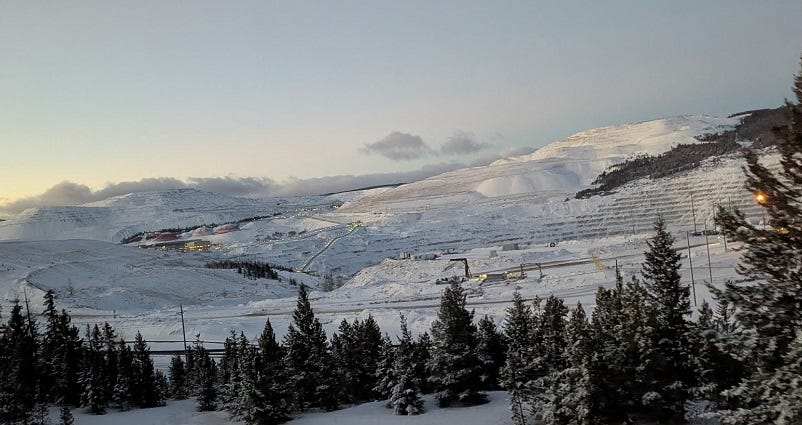Winter at CCMI and a CEO chat with GSP Resources
I wrote about GSP Resource Corp. (GSPR.V) last week and ended the piece by saying it impressed me enough that it was time to call the CEO. And then I came down with a nasty, if short lived, cold.
As luck would have it I was well enough to call Simon Dyakowski just as a news release was hitting the wire. The release focuses on GSPR’s plans for the upcoming drill season and that was the focus of our chat.
In the release Dyakowski states,
The discovery of high-grade gold mineralization represents a unique opportunity to re-frame the Alwin Mine Project in the context of its potential to host broader copper plus gold-silver resources. The resource expansion potential represented by these high-grade gold zones in the context of potential copper equivalence, if we can establish geologic continuity, cannot be understated
When I call a CEO it is not at all a formal interview. I don’t take formal notes and what I am trying to figure out is whether the company has a plan and if that plan is realistic.
Dyakowski is a third generation BC resource guy. His grandfather was in the business back in the 1960’s and his dad acts as Chairman and Director of the company. This is good to know simply because it means that Dyakowski knows the business intimately having grown up with it.
Our conversation was all about the Alwin Project with a minor discussion of the nearby Mer Project. Both projects butt up to Teck Resources land and the Highland Valley Copper Mine which is the largest copper mine in Canada. (As it happens my youngest is up at that mine right now wiring up a solar farm on reclaimed land. He took this picture of the mine at dawn.)
Dyakowski gave me a bit of the history of the Alwin project which, in fact, had an operating mine in the 1960s. There was a lot of historical drilling done and one of the major wins for GSPR was obtaining an “extensive collection of historical exploration data from the past producing Alwin Copper-Gold Mine. This dataset includes over 50,000 metres of surface and underground drilling”. (release) The historic data ran an average of 1.8% copper.”
Dyakowski told me they are planning took a bit of a pivot when they got their recent high grade gold results back. They knew they had a growing copper resource but now gold enters the picture.
The better gold grades are contained in mineralization which is distinct from the copper bearing mineralization GSPR has already logged at Alwin. Dyakowski is eager to drill it but also considering an early IP reconnaissance to get a sense of the potential targets before committing the drills.
The company has money in the bank from a $650,000 private placement back in September 2024 - a question I always ask. But a serious drilling program will likely require a further raise. Dyakowski, like every CEO I talk to, would prefer to do that raise with a higher than $0.11 share price. I suspect that is part of the motivation for early IP.
I asked how they get along with Teck across the valley. “Great neighbours,” said Dyakowski, cards close to his chest.
I was impressed.
***
As expected, Winter slightly reduced the tonnage Canadian Critical Minerals (CCMI.V) shipped from the Bull River Mine stockpile: 415 tons grading 5.37% copper, 0.075 gpt gold and 60 gpt silver for a payout of 159,000 USD.
Ian Berzins, CEO commented, “While the total tonnes sent to New Afton during January 2025 were lower than planned, we once again achieved some of the highest grades yet for ore sorting at the Bull River Mine.”
The great risk of a junior developer is that it will run out of money before it gets to the finish line. CCMI has been cleaning up its balance sheet, issuing flow through shares and doing the paperwork for the permits it needs to bring the Bull River Mine back into production. Having a steady, if fluctuating, revenue stream from processing the stockpile of already mined rock gives CCMI a little extra runway.
The company is fine tuning the Bayhorse Silver (BHS.V) ore sorter which Berzins cannily rented to high grade his rock. When trucking is a major cost you want to move the minimum amount of material for the maximum payout. Which means you “reject” a lot of rock which is mineralized at lower grade. CCMI has the advantage that this rejected rock can be stockpiled and, when the Bull River mill is recommissioned, processed.
The BC Government, faced with the Trump tariffs and their potential impact on the BC economy, has become a lot more mining friendly. Whether this will translate to a quick permit for Bull River is anyone’s guess, but it is potentially very good news.
(Disclaimer: I hold a position in CCMI which I may add to or sell at anytime. I do not presently have a position in GSPR. This is not investment advice. Do your own due diligence. Call the CEO. I did.)




